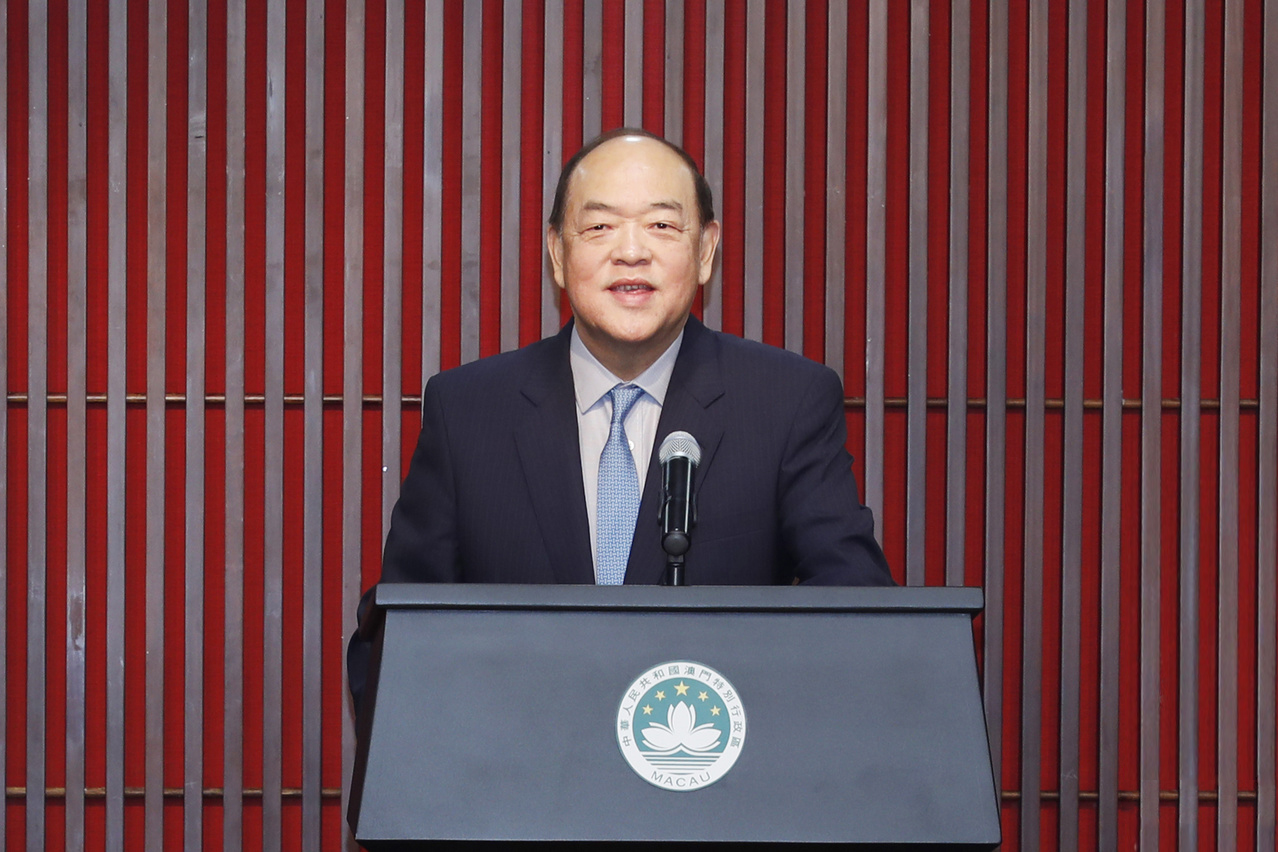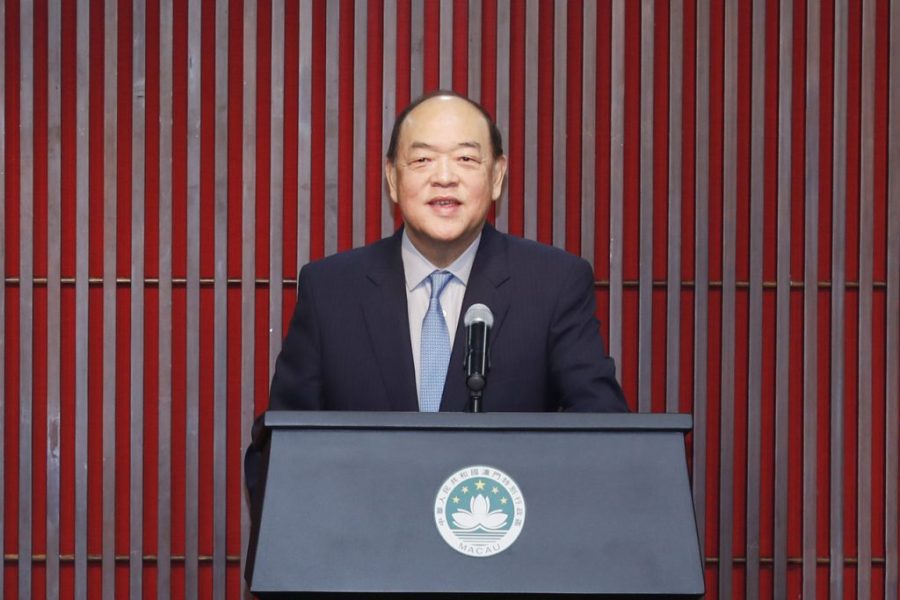In a roundup of his three-day visit to Beijing on Thursday, Chief Executive-designate Ho Iat Seng pledged that he will solve the “historical issue” of the current gaming concession and sub-concession model — the gaming industry’s so-called “3+3” system.
Addressing a press briefing at the Representative Office of the Macau Special Administrative Region (MSAR) in Beijing Thursday morning before returning to Macau, Ho also said he was determined to “take the first step” to get the policies and measures mentioned in his election campaign platform off the ground gradually in his upcoming five-year term, pledging to keep the promises that he has made to Macau residents.
Ho, who travelled to the nation’s capital on Tuesday, received a State Council decree from Premier Li Keqiang on Wednesday morning designating him as the fifth-term chief executive of the MSAR, after which he had a meeting with Li. Then in the afternoon on the same day, Ho had a meeting with President Xi Jinping.
Ho said that he was glad that when Xi met him on Wednesday the president gave him guidance on his future governance, adding that he thanked the central government for its support. Ho said that during Wednesday’s meeting, Xi told him to administer Macau with “big-picture” thinking, following his transition from president of the Macau Legislative Assembly (AL) to chief executive of the Macau Special Administrative Region (MSAR).
Ho underlined the change in his role on previous occasions and this time when travelling to Beijing. Ho said that he had previously travelled to Beijing as a member of the National People’s Congress (NPC) Standing Committee when he participated in the work of the highest organ of state power, such as monitoring the work of the administrative branch of the central government and nation’s two top judicial bodies – the Supreme People’s Court and the Supreme People’s Procuratorate, making decisions on the nation’s development and taking part in legislative work.
Ho said that he had a change in his role when travelling to Beijing this time – from working in the nation’s top legislature to working in the area of public administration as a chief executive-designate, meaning that his position was shifting from that of a supervisor to the one of being supervised. Ho pointed out that Macau’s chief executive is accountable to the central government and Macau residents. Ho said that “these are new duties and challenges for which I will face very big pressure.”
Three ‘red lines’
Ho also noted that during Wednesday’s meeting, Xi “clearly” told all Chinese people and compatriots in Macau that the “One Country, Two Systems” principle has proved to be a workable solution. Ho noted that Macau has been enjoying social stability in its development over the past 20 years, adding that Macau will have to continue to remain steadfast in adhering to the principles of “One Country, Two Systems”, “Macau people governing Macau” and a high degree of autonomy, to defend national security and Macau’s social stability. Ho also said that Macau must never challenge the three “red lines” set by the central government and undermine the “One Country, Two Systems” principle.
The three “red lines” that have been set by the central government are three acts that are “absolutely” impermissible for the nation’s two special administrative regions: 1) endangering national sovereignty and security, 2) challenging the power of the central government and the authority of the Basic Laws of Hong Kong or Macau, 3) using Hong Kong or Macau to carry out infiltration and sabotage activities against the mainland.
Ho also said that after Macau’s return to the motherland in 1999, the city has been managed by Macau people, during which the MSAR government has been formulating and implementing its policies in line with Macau residents’ well-being.
Ho reiterated that he will not compare Macau with Hong Kong in their respective implementations of the “One Country, Two Systems” principle, because each has its own characteristics and strengths, adding that Macau will focus on its own path in pursuit of improving its people’s livelihoods and happiness, which he said is what Xi mentioned concerning the implementation of the “One Country, Two Systems” principle with Macau characteristics.
Ho said that the enactment of the local Law on the Defence of National Security based on the Article 23 requirement of the Macau Basic Law in 2009 was a good example for the implementation of the “One Country, Two Systems” principle in Macau. Ho reaffirmed that Macau must never be allowed to descend into chaos as the city’s income primarily comes from the tourism and gaming sectors.
‘Historical issue’
Ho also said that he will continue to push ahead with the proposed amendments to the current law regulating the gaming sector after taking office. Ho noted that the current government has already launched preparatory work to draft possible amendments to the gaming law which was enacted in 2001, adding that therefore he would not comment on the matter – as to how the law should be amended – at the moment, before taking up his post as chief executive.
Ho, 62, is slated to be sworn in as MSAR chief executive on December 20 – the 20th anniversary of Macau’s return to the motherland.
Ho, a veteran industrialist, business community leader and lawmaker, said that the future process of the proposed amendments to the gaming law will include a public consultation process and a review by the legislature, adding that the various existing problems in the regulation of the gaming sector could be solved after the gaming law is amended.
The amendments to be proposed by Ho’s future government must be submitted to the legislature for debate and vote.
The current gaming law stipulates that a maximum of three gaming concessions were to be granted. The government announced the results of the gaming concession bidding process and granted concessions to SJM, Wynn and Galaxy in early 2002. In late 2002, the government allowed Galaxy to set up a sub-concession relationship with the Venetian – by amending Galaxy’s concession contract. Following the issuing of the first sub-concession, SJM and Wynn signed their own sub-concession deals in 2005 and 2006 respectively, SJM with MGM and Wynn with Melco. The three gaming concessions and three sub-concessions will expire in 2022.
Ho said that the gaming law amendment bill to be drafted by his future government will “clearly” stipulate the maximum number of gaming concessions to be granted in the future. “Issues such as how many concessions are to be granted and whether sub-concessions will be granted will be clearly mentioned” in the amendment bill.
According to the Macau Post Daily, when asked by the media whether his future government will plan to change the current situation of three gaming concessions and three sub-concessions, Ho said that it would depend on how the gaming law will be finally amended. Ho noted that “the current gaming concession system is a model of three plus three. But actually the gaming law only stipulates [a maximum of] three gaming concessions, which means that [the existence] of the three others is a historical issue,” Ho said, adding that while he would respect the gaming industry’s “history”, i.e. the current 3+3 situation, he would solve the issue “created by history”, with the aim of ensuring that no chaos will be created in the run-up to the expiration of the three gaming concessions and three sub-concessions.






